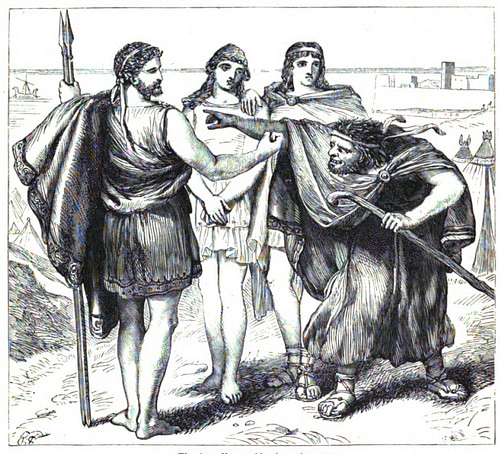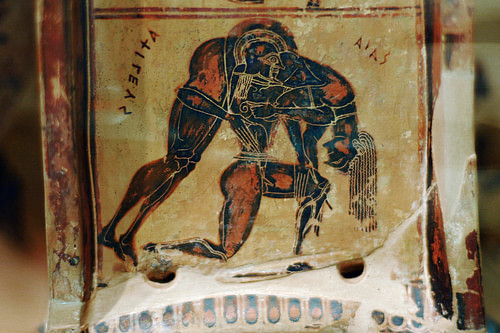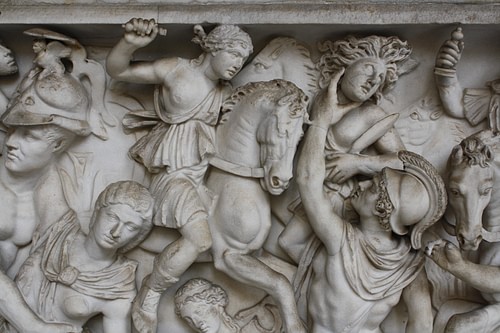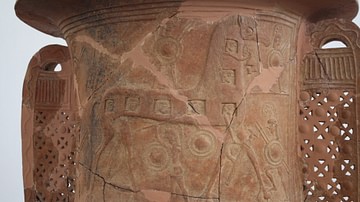
Thersites is a character in the Iliad who made a stand against Agamemnon and the enterprise of the Trojan War. Homer chose to add Thersites’ speech after Achilles’ infamous dispute with Agamemnon, probably to emphasize the struggles that the Achaean side underwent during the war. Thersites' speech signified the first instances of equality that were displayed in the ancient Greek world.
The Theme of the Iliad
When one hears the name of Homer one immediately recalls the well-known Trojan War, the epic clash between the Achaeans under King Agamemnon and the Trojans under King Priam. Although, by looking deeper into the origins of this legendary tale of warfare, one notices the lack of evidence for many aspects of the monumental poem. Apparently, modern scholars can not even be certain about Homer’s personal information or the number of the Iliad's contributors. Furthermore, there are problems with identifying other aspects of the poem, such as the date and place that it was written down. Nevertheless, between the late 9th century and late 8th century BCE, an adapted Phoenician alphabet was introduced to the Greeks providing a more clear indication for the approximate date of the poem’s composition, as we know it today. Despite the modern debate on how long after the introduction of the alphabet the Homeric poems could have been written, it would seem that the myth of the great Trojan War considerably preceded its composition. The myth would have been preserved by each generation through its transmission through a well-established oral tradition. Through this manner of story-telling, our protagonist, Thersites begins to exist!
Homer’s details of the Trojan campaign cover 24 books. Although the narrative of the Iliad covers only 52 days of the clash, the alleged Trojan War was resolved in ten years, indicating a special focus that the narrator intended to give to these events. The first book describes the conflict of the apparent leading figures, King Agamemnon and his widely acclaimed warrior Achilles that stigmatized the campaign. On the one hand, the king, who gathered the immense forces of the Achaeans under his iron fist, on the other hand, the legendary hero, whose martial attributes drive the course of the epic poem. The 24th book concludes with the return of the deceased Hector to his father Priam after an emotionally strong (and fatal) interaction with Achilles. The probable intention of Homer was to liken the prince’s fall with the demise of the city, as his presence on the Trojan side was crucial for the defense of the highly desired Troy. Furthermore, among the two distinguished Achaean characters, the resourceful Odysseus, king of Ithaca, and Nestor the wise, the king of Pylos determine the course of the events with their own well-attested attributes.
Thersites: Name & Appearance
The Thersites character remained known through time as the commoner who stood up against Agamemnon and the noble Achaeans during the Trojan War. His most elaborate description emerges from Homer, whose attestations represent our grounds to unravel this infamous persona. The name Thersites derives either from thersos or the Aeolian tharsos that could stand for audacity, courage, or insolence. It has been noted by modern scholars that Homer’s omission of Thersites’ family name, as well as the lack of his birthplace, is quite rare for a Homeric character. Consequently, it has been argued that the character’s demonstration in the Achaean assembly aimed to represent the common soldier's opinion. Apparently, Homer deemed it necessary that Thersites should have a highly diminished status. He did not only accomplish this by concealing his lineage but through the description of his divergence from the average Greek physical appearance. Thersites is portrayed as a malformed man, and interestingly the details of his looks are most meticulous compared to other characters. Could Thersites’ form, as depicted by Homer, resemble the stigma given by the nine years of slaughter?
He was bandy-legged and lame in the one foot, and his two shoulders were rounded, stooping together over his chest, and above them, his head was warped, and a scant stubble grew thereon.
(Homer, Iliad, 2.111-222)

In addition, Homer describes him as speaking in a disoriented manner, as his anger could confuse his train of thought. Ηe is depicted as a crusty individual, who does not hesitate to kick against Achilles and Odysseus, possibly in some sort of long-running feud. As a result, Thersites is hated by the noble heroes, as his expressed statements and beliefs would have been equally disturbing to them. Eventually, Odysseus hits Thersites with his scepter, which triggers his fellow soldiers’ laughter while he restrains the restless agitator and brings him to order.
The Prelude of Thersites’ Speech
Thersites’ speech takes place at the beginning of the second book that follows the devastating blow for the Achaeans. The morale of the Mycenaean coalition’s ranks had been significantly shattered after a dispute between Agamemnon and Achilles, causing the latter to abandon the prolonged war. The core factor for the dispute was the hate that resided in the two men. Both were ambitious enough to set their personal interests and needs above the rest, an instance that clearly demonstrates the contradictions of the poems’ heroic figures. This dispute occurred after the arrival of the Trojan priest of Apollo Chryses and the request for his daughter Chryseis’ return. Furthermore, Chryses was willing to offer payment for his daughter's liberation. Agamemnon refused the offer, leading the priest to pray to Apollo for justice. The deity swiftly answered his invocation and unleashed a catastrophic plague in the Achaean stratopedon (military camp), punishing Agamemnon’s insolence for the capture of Chryseis. The victims of the deathly disease, being in despair, sought the seer Kalchas, who indicated the king as the reason for Apollo’s wrath due to the rejection of Chryses’ offer. Agamemnon eventually returned Chryseis but demanded a new prize, which would be taken by force, if not given freely by his companions.
The speech of Achilles, concerning Agamemnon's greed, among other accusations, must have triggered the decision of the king to “confiscate” the great warrior’s booty, the well-desired Bryseis. As a result, the menis (wrath) of Achilles was provoked, leading the Thessalian warrior from Phthia to withdraw from the battlefield with his troops. As a consequence, the Achaeans lost a valuable asset for the capture of Troy, among their already diminished morale after nine years of fighting a war for their leaders’ greed. For the record, Achilles’ return to the battlefield is signified in book 16 after the death of his best friend Patroclus by the hand of Hector. Modern scholars identify the Iliad’s political story as a narrative of failed leadership that is indicated by the quarrel between the two strong personalities. The beginning of book 2, where Thersites’ speech takes place, is a crucial moment for Homer’s demonstration of criticism toward aristocratic abuse and mismanagement of authority. Therefore, he chooses Thersites to display the disheartened opinion of the ordinary demos toward their leaders.
Thersites’ Speech
Thersites appears in the early part of Book 2 to emphasize the frustration of the common Achaean warriors after the continuous blows their side has suffered. The greatest among the Greek gods, Zeus, sends a false prophecy to Agamemnon, which indicates the fall of Troy if the attack is imminent. Moreover, after raising a council for the handling of the prophecy, the king, wanting to test the morale of his soldiers, declares to his subjects they should flee for home. Meanwhile, the rest of the leaders, such as Nestor and Odysseus, must restrain the audience and bring them to order. The successful persuasion by the Achaean nobles would have signified the zeal of the army. While the strategy unfolds, and silence dominates the assemblage, Thersites breaks the silence and is introduced by Homer.
Son of Atreus, what are you unhappy about this time, or what do you lack? Your huts are filled with bronze, and there are many women in your huts, chosen spoils that we Achaeans give you first of all, whenever we take a city. Or do you still want gold also, which one of the horse-taming Trojans will bring you out of Ilios as a ransom for his son, whom I perhaps have bound and led away, or some other of the Achaeans? Or is it some young girl for you to know in love, whom you will keep apart for yourself? It is not right for one who is their leader to bring the sons of the Achaeans harm. Soft fools! Base things of shame, you women of Achaea, men no more, homeward let us go with our ships, and leave this fellow here in the land of Troy to digest his prizes, so that he may learn whether we, too, aid him in any way or not.
(Iliad, 2.243-270)
Thersites addresses the assembly without the traditional aristocratic ritual of holding the customary scepter, which Odysseus received when he followed Agamemnon’s speech. Moreover, Thersites’ diction demonstrates a hopeless solicitation to the Achaean rank and file, the demos, due to his already weakened position, as his “bitter irony” toward the king indicates. As Homer testifies, Thersites indulged in similar occasions, where he placed himself in opposition with other great heroes. Nevertheless, Odysseus' reaction does not deny the arguments of the aspiring revolutionary, rather, Thersites is denied the privilege of speech through brute force. After the suppression of Thersites’ radical speech, the enticing arguments of Nestor and Odysseus had to be presented to the assembly so the war could continue.
Thersites after the Iliad
According to the Epic poem Aethiopis, the Thracian daughter of Ares, the Amazon Penthesilea, becomes the starting point of the quarrel between Achilles and Thersites. The scene is set by the arrival of the Amazons as allies of the Trojans. Among them is Penthesilea, a beautiful and courageous warrioress. She draws the attention of the legendary Achilles, who does not waste any time killing her and delivering her soul to the ferryman of Acheron, the entrance to the well-known Underworld of Hades. Although it seems that the hero feels some sort of remorse after his murderous actions. At that moment Thersites emerges, and through one of his well-attested speeches mocks Achilles for his inappropriate feelings. That speech signifies the finale of the eloquent individual. As Achilles moves against our protagonist, Thersites follows the Amazon’s soul down to Acheron.
Additionally, after an extended time period, approximately in 1602, Homer's Trojan War inspired Shakespeare for an adaptation of the events into a romantic play. The two lovers, Troilus and Cressida demonstrate the main theme of the play, that of love and war. The English playwright preferred to amplify, compared to the Iliad, the roughness of Thersites’ speech. Apparently, he was determined to make our protagonist a ludicrous character to offer a comedic relief to the audience of his peers. Lastly, through Thersite's presence, Shakespeare likely wanted to display the flaws of the Greek heroes.
Thersites & Equality
Among the various modern interpretations of Thersites’ speech in the Iliad, the incident is characterized by the promotion of the first instances of equality in a society influenced and ruled by the continuous social circles of the elites. The adaptation of egalitarian notions into a politicized demos that is expressed through Thersites may provide a fascinating insight into the mindset of the era. In a narrative that is typically compiled of aristocratic values, Homer’s intention to display the opinion of a common soldier signifies the social conditions that would eventually succeed the highly hierarchical dominant circles. Furthermore, Thersites’ speech signified the eminent role of the common soldiers in the war, as a reciprocal relationship between the leaders and the followers who populate the Homeric world. The leaders needed the soldiers to fight and sacrifice themselves for their wars, in parallel, the leaders, guided by the gods, would provide valiant leadership.
The presentation of the Trojan War’s events from the viewpoint of Thersites, a commoner among heroes, resembles the unfair treatment that the Achaean rank and file witnessed. In addition, Thersites' reference to his fellow companions, who made up the bulk of the Achaean army, in order to provoke them to abandon Agamemnon and let him fight the war by himself, adds another instance of equality in the Homeric poem. This cry of exasperation was triggered by a king who could not be satisfied by the vast riches his army had already provided and so he continued to put his greed above the welfare of his subordinates. Evidently, these oligarchic attitudes, among other instances, were held responsible for the emergence of more and more commoners who organized themselves and made a stand against the “Agamemnons” of the Greek world who frequently took the form of tyrants.










